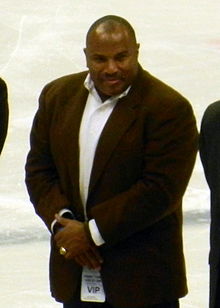
Edward Nathan George Jr. is an American football coach and former player who is the current head football coach at Tennessee State University. He played as a running back in the National Football League (NFL) for nine seasons, primarily for the Houston / Tennessee Oilers / Titans franchise.

Frederick Antwon Taylor is an American former professional football player who was a running back in the National Football League (NFL) for 13 seasons from 1998 to 2010. He played college football for the Florida Gators and was selected by the Jacksonville Jaguars ninth overall in the 1998 NFL draft. Taylor played for the Jaguars and New England Patriots and a member of the 10,000 yard rushing club. He is a co-host of The Pivot Podcast with friends, Channing Crowder and Ryan Clark.

Donovan Jamal McNabb is an American former professional football quarterback who played in the National Football League (NFL) for 13 seasons, primarily with the Philadelphia Eagles. He played college football for the Syracuse Orange and was selected with the second overall pick in the 1999 NFL draft by the Eagles, where he spent 11 seasons. McNabb also spent a year each with the Washington Redskins and Minnesota Vikings. The Eagles retired McNabb's no. 5 jersey when he was inducted to the Philadelphia Eagles Hall of Fame in 2013.
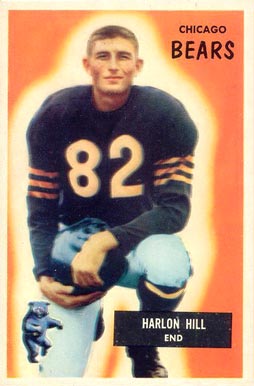
Harlon Junius Hill was an American professional football end who played for nine seasons in the National Football League (NFL). Hill played for the Chicago Bears, the Pittsburgh Steelers, and the Detroit Lions. He was the NFL Rookie of the Year in 1954 and winner of the Jim Thorpe Trophy as the NFL Player of the Year in 1955. The Harlon Hill Trophy, named in his honor, is awarded annually to the nation's best NCAA Division II football player. After his playing career, he became a coach and educator.
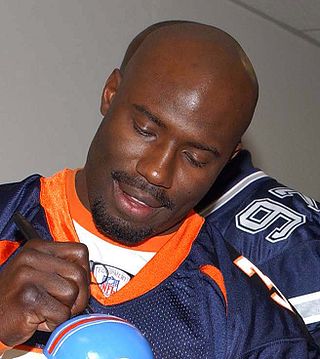
Terrell Lamar Davis is an American former professional football player who was a running back for the Denver Broncos of the National Football League (NFL) from 1995 to 2001. He is the Broncos all-time leading rusher and still holds the record for most postseason single-season touchdowns (eight), which he achieved in 1997. He is also credited with starting the "Mile High Salute", a celebratory tradition among Denver Broncos players after scoring a touchdown. Davis was elected into the Pro Football Hall of Fame in 2017. Despite his short seven-year tenure, Davis is often regarded as one of the greatest running backs of all time.

Phillip Martin Simms is an American former professional football quarterback who played in the National Football League (NFL) for 14 seasons with the New York Giants. After playing college football for the Morehead State Eagles, Simms was selected in the first round by the Giants as the seventh overall pick in the 1979 NFL draft. Simms was named Most Valuable Player (MVP) of Super Bowl XXI, after he led the Giants to a 39–20 victory over the Denver Broncos and set the record for highest completion percentage in a Super Bowl, completing 22 of 25 passes (88%), as well as the highest passer rating in a Super Bowl at 150.9; both of these records still stand. He was also named to the Pro Bowl for his performances in the 1985 and 1993 seasons.

Ottis Jerome Anderson is an American former professional football running back who played in the National Football League (NFL) for 14 seasons with the St. Louis Cardinals and New York Giants. He played college football for the Miami Hurricanes, where he set the school record for rushing yards, and was selected eighth overall in the 1979 NFL draft by the Cardinals.

Atiim Kiambu "Tiki" Barber Sr is an American former professional football running back who spent his entire 10-year career with the New York Giants of the National Football League (NFL). He played college football for the Virginia Cavaliers. Barber was selected by the Giants in the second round of the 1997 NFL draft. Barber retired from the NFL at the end of the 2006 NFL postseason as the Giants' all-time rushing and reception leader. He is one of only four players with 5,000 rushing yards and 5,000 receiving yards. Barber was inducted into the Virginia Sports Hall of Fame in 2011.
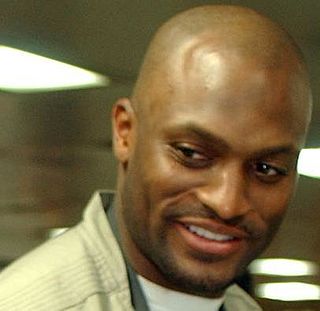
Amani Askari Toomer is an American former professional football player who spent his entire career as a wide receiver and punt returner for the New York Giants of the National Football League (NFL). He registered over 1,000 receiving yards each season from 1999 to 2003, was a member of the 2007 Giants team that won Super Bowl XLII, and holds Giants' club records with 9,497 receiving yards, 668 receptions, and 54 receiving touchdowns. He also returned 109 punts for 1,060 yards and three touchdowns. As a rookie in 1996, he led the NFL with an average of 16.6 yards on 18 punt returns.

Warrick De'Mon Dunn is an American former professional football player who was a running back for 12 seasons in the National Football League (NFL). He was selected by the Tampa Bay Buccaneers 12th overall in the 1997 NFL draft, after playing college football for the Florida State Seminoles. Dunn was named AP NFL Offensive Rookie of the Year in 1997 and earned three Pro Bowl selections in his career. After his playing career, Dunn took a minority stake in the Falcons' ownership group led by Arthur Blank.

Elbert L. "Ickey" Woods is an American former professional football player who was a running back for the Cincinnati Bengals of the National Football League (NFL) from 1988 through 1991. He played college football for the UNLV Rebels. He is best remembered for his "Ickey Shuffle" end zone dance, performed each time he scored a touchdown. After a rookie season in which he set numerous rookie franchise records, a series of injuries shortened his NFL career and he retired after four years.
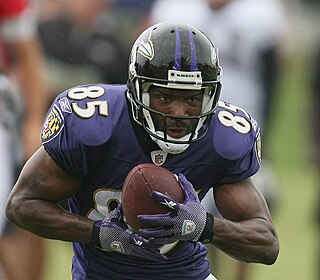
Derrick James Mason is an American former professional football player who was a wide receiver for 15 seasons in the National Football League (NFL). He was selected by the Tennessee Oilers in the fourth round of the 1997 NFL draft after playing college football for the Michigan State Spartans. Following eight seasons with the Oilers franchise, including two Pro Bowl selections, Mason signed with the Baltimore Ravens in 2005. He became the Ravens' all-time leading receiver with 5,777 yards from 2005 to 2010. He spent 2011 with the New York Jets and Houston Texans. Mason retired as a Baltimore Raven on June 11, 2012. He was the last active NFL player to have played for the Oilers.
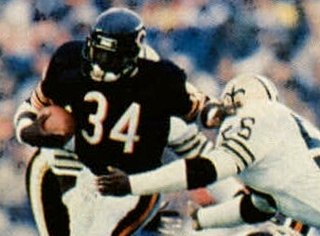
Walter Jerry Payton was an American professional football running back who played in the National Football League (NFL) for 13 seasons with the Chicago Bears. Nicknamed "Sweetness", he is widely regarded as one of the greatest football players of all time.
The 1977 Chicago Bears season was their 58th regular season completed in the National Football League. The team finished with a 9–5 record, which was their first winning season since 1967 and earned them a wild card spot against the Dallas Cowboys, who eventually beat the Bears 37–7 en route to a Super Bowl victory. This was their first postseason appearance since winning the 1963 championship. They secured this by winning their last six games, including among others the last of the Tampa Bay Buccaneers’ record run of 26 consecutive losses.
The 1986 season was the New York Giants' 62nd in the National Football League (NFL) and their fourth under head coach Bill Parcells. The New York Giants, who play in the National Football Conference (NFC) of the National Football League (NFL), won their fifth championship—and first Super Bowl—in franchise history during the season. Led by consensus league Most Valuable Player (MVP) linebacker Lawrence Taylor and Super Bowl MVP quarterback Phil Simms, the Giants posted a 14–2 record during the regular season, tied for the best record in the league with the defending Super Bowl champion Chicago Bears. The Giants improved on their 10–6 record from 1985, won their first division championship since the NFL-AFL merger in 1970, and won Super Bowl XXI against the Denver Broncos.

The 1981 San Francisco 49ers season was the franchise's 32nd season in the National Football League (NFL), their 36th overall and their third under head coach Bill Walsh.

The 1988 season was the San Francisco 49ers' 39th in the National Football League (NFL), their 43rd overall, and their tenth and final season under head coach Bill Walsh. The season was highlighted by their third Super Bowl victory. They failed to improve on their 13–2 record from 1987, and the 49ers struggled to a 6–5 record at the midway point and were in danger of missing the playoffs for the first time since 1982, but rose to defeat the Washington Redskins on a Monday night, eventually finishing the season at 10–6. They gained a measure of revenge by thrashing the Minnesota Vikings 34–9 in the first round of the playoffs; the Vikings had upset the #1-seeded 49ers the previous season in the divisional round. The 49ers then traveled to Chicago's Soldier Field, where the wind-chill factor at game time was 26 degrees below zero. They defeated the Chicago Bears 28–3 in the NFC Championship game.
The 1970 Cincinnati Bengals season was the franchise's first season in the National Football League (NFL), and the third overall. The NFL-AFL merger took place before the season and the Bengals, who were placed in the same division as the "old-guard NFL" Cleveland Browns and Pittsburgh Steelers, were not expected to be playoff contenders. Nevertheless, the Bengals made their first NFL campaign a memorable one. After winning their first ever game as a member of the NFL, their inaugural game in the brand new Riverfront Stadium, they would lose six games in a row.
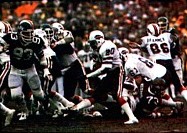
The 1981 Buffalo Bills season was the franchise's 12th season in the National Football League, and the 22nd overall.

The 2011 Wisconsin Badgers football team represented the University of Wisconsin–Madison in the 2011 NCAA Division I FBS football season. The Badgers, led by sixth-year head coach Bret Bielema, are members of the Leaders Division of the Big Ten Conference and played their home games at Camp Randall Stadium. They finished the season 11–3, 7–2 in Big Ten play to be Leaders Division co–champions with Penn State. Due to their head-to-head win over Penn State, the Badgers represented the division in the inaugural Big Ten Championship Game where they defeated Legends Division champion Michigan State 42–39 to become Big Ten Champions. They were invited to the Rose Bowl for the second consecutive year where they were defeated by Oregon 38–45.
